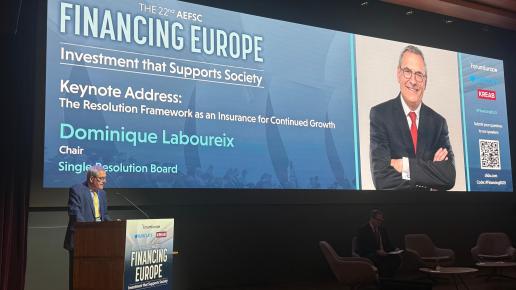[Check against delivery]
Good afternoon, Madam Chair, Honourable Members, ladies and gentlemen.
It is a pleasure to be here with you today.
Let me start by thanking you for your thorough and speedy work on the process for the nomination of our new Vice-Chair and Board Members.
A fully staffed Board is critical for the well-functioning of the SRB.
I know that the hearings of the selected candidates will take place later this afternoon. So, let me wish the best of luck to Slavka, Radek and Miguel!
Honourable Members, to begin, I will update you on our work with three positive developments.
First, at the end of third quarter of last year, no bank was falling short of their MREL requirement. Only four banks, with special situations, still have time to reach full MREL capacity. It is worth restating this, quarter after quarter, because it is a great achievement!
Second, our rainy-day fund is still full! So - unless circumstances change - banks will not need to pay into the Single Resolution Fund in 2025, like in 2024. Today, we have a safety net of 80 billion euros.
Third, we are finalising our first on-site inspection and we will start our second one next week. When I took my position, I promised to develop and implement this new tool, and it is now in place.
I will certainly have more updates on our work for our next hearing in July but I would not like to end this update without mentioning that exactly 10 years ago, the SRB started its “race” on resolution readiness.
Since the last time I was here, many things have changed in the European and international landscape. These are, by all standards, momentous times.
Let me try to summarise them with three keywords: simplification, competitiveness and volatility.
In Europe, the policy world is abuzz with simplification. This is very good! Simplification should always be a factor in the cost-benefit analysis of a legislation.
Clearly, though, simplification should be guided by a simple principle: slash redundant rules while preserving the objectives of the regulation. With the second part of the sentence being as important as the first one.
This is what we are also trying to do at the SRB with our new strategy. However, we move within the boundaries of the legislation.
But you, Honourable Members, together with Council, have instead a great chance to both simplify and make our framework more effective through CMDI.
How? Let me give you my “practitioner view” one more time:
Provide us additional tools – such as the DGS bridge - that we can use simply in the space of a weekend.
Give Banking Union authorities rules that are as simple as the ones for the authorities outside of it.
Don’t make the governance of an agency - which has the ultimate goal of taking swift decisions - unduly complex.
Revise important technical aspects of the framework that make our and the banks’ lives difficult - for example, the complex approach that BRRD foresees for impracticability to include bail-in recognition clauses in contracts - Article 55 BRRD.
Besides CMDI, let me also agree with this Committee that a complex screening of foreign direct investment during a resolution weekend can be detrimental for the swift decision making needed in a crisis. So let me thank you, Honourable Members, for your proposed amendment in this Committee’s recent opinion on the FDIR.
A simple and usable resolution framework will also help on being - and staying - more competitive. Another keyword.
This, Honourable Members, is what CMDI is supposed to help with – protecting financial stability and the real economy by expanding the role of resolution and introducing the right tools to expand it.
We are not alone in this. The government of the United Kingdom, strong from the lessons learned after the 2023 crises, proposed reforms similar to the ones featuring in CMDI.
To keep it simple, if we face too many hurdles when resolving banks, who will foot the bill for the next crisis?
Finally, we see a very volatile world. I am not the most qualified to discuss macro trends but I can tell you that the resolution framework is there to help protecting us from the downside of this volatility.
Maintaining financial stability, avoiding bailouts. This is what it is all about!
In conclusion, volatile times call for a strong resolution toolkit.
By delivering a usable CMDI, you can make our resolution framework simpler and more effective.
A simple and effective resolution toolkit will, in turn, help protect financial stability, our countries’ budgets and - crucially - also those companies that will make tomorrow’s Europe more competitive.
Having this in mind, I hope that both Parliament and Council will find ways to compromise so to provide us with such a toolkit.
Thank you for your attention!
Contact our communications team
Recent speeches
Related news and press releases

"The resolution framework as insurance for continued growth" speech by SRB Chair Dominique Laboureix




